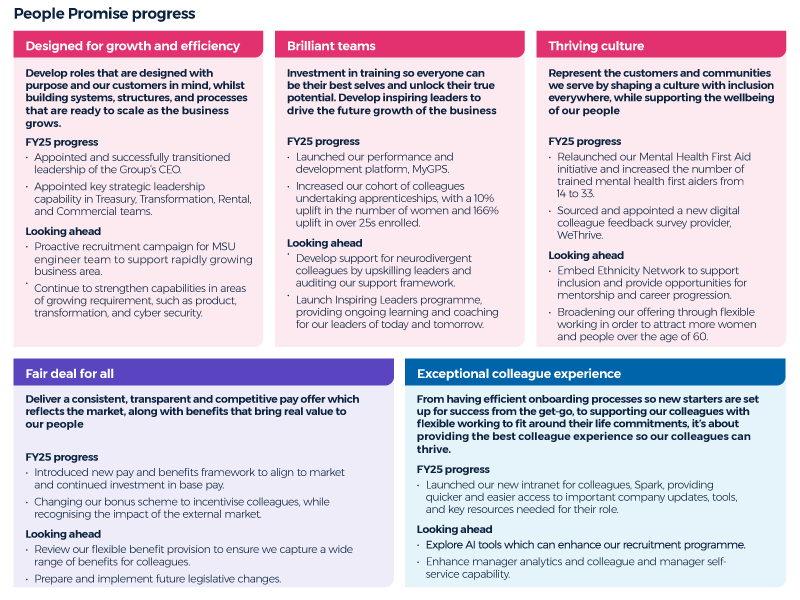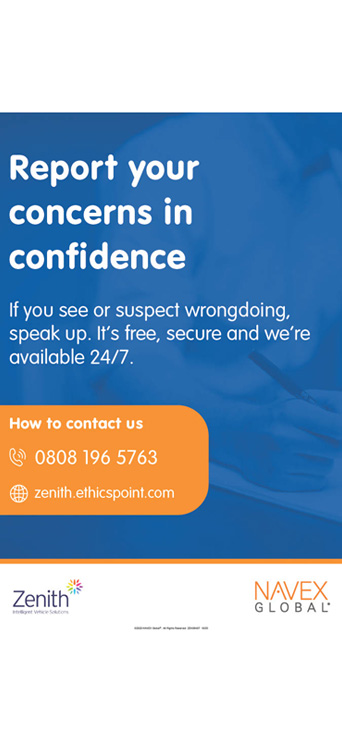Our progress and commitment in 2025
Zenith’s purpose is keeping our customers moving, sustainably. This includes ensuring that human rights are upheld through all our relationships, and ensuring that modern slavery and human trafficking are not present in our business or supply chain.
This is our ninth annual Transparency Statement covering our financial year up to the end of March 2025. We’re proud to share the strides we’ve made in this critical area, in line with the Modern Slavery Act 2015.
The information disclosed in this statement has been gathered by our Sustainability Manager with support from multiple key colleagues and groups across the business.
“The risk of modern slavery is increasing, both within the UK and globally. At Zenith, we’re addressing this through our People Powered Impact plan. Within our business and through our supply chain partners, we’re committed to delivering a safe and healthy workplace, free from exploitation and discrimination.
In FY25 we made great strides regarding supplier engagement around human rights. This is the first step in our ongoing collaboration with our key suppliers to ensure that modern slavery does not take place anywhere within our supply chain.”
Mark Wilson, Sustainability Manager

About our organisation
A leader in ethical vehicle solutions
Zenith Group is the UK’s leading independent leasing, vehicle outsourcing, and fleet management provider and operates across the following Group companies:
- Zenith Vehicle Contracts Limited
- Provecta Car Plan Limited
- Leasedrive Limited
- ZenAuto Limited
- Contract Vehicles Limited
- Contract Vehicle Fleet Services Limited
- Contract Vehicles Rentals Limited
- Zenith Remarketing Limited
Zenith directly funds 75,514 vehicles and has 166,380 vehicles under management.
We operate from fourteen locations across the UK, including two main offices in Leeds and Altrincham alongside a shared workspace in Solihull, eleven rental yards, and one HGV workshop.
You can find out more about Zenith’s purpose, values, and structure within our FY25 Annual Report.
Our people
Our team includes administration staff, professional services roles such as finance, information technology, marketing, customer service representatives, sales professionals, skilled automotive mechanics, technicians, and welders.
All Zenith colleagues are on houred contracts, and we do not use any zero hours contracting.
Our culture is driven by our People Promise, with three clear focus areas aimed at creating a thriving culture with brilliant teams that are designed for growth. Our promise is underpinned by commitments to provide a fair deal for all and an exceptional colleague experience.

Our supply chain
Diverse, dynamic, and diligent
Zenith’s supply chain is operationally and geographically diverse to ensure that we can deliver the best possible service to all our customers. To ease our analysis of modern slavery risk, we have grouped our suppliers into several categories, as seen in the infographic below.
Procurement
Vehicle manufacturers and dealer network
Short-term vehicle rental providers
Fleet Management and In-life
Vehicle garages
Vehicle repair bodyshops
Emergency Assistance
Tyre and glass providers
Delivery and collection agents
End-of-life
Auction houses
Direct Zenith Suppliers
Recruitment agencies
IT providers
Professional services – legal and marketing
Facilities and waste management providers
We work closely with our supply chain partners across all categories to develop strong relationships, based on shared values, that uphold and protect human rights.
- Our supply chain includes suppliers of both goods and services.
- We map our supply chain using in-house knowledge, expertise, and tools. Responsibility for this process sits with our Supplier Governance and Risk Forum.
- The vast majority of our supply chain is UK-based, such as our fleet management and in-life services and direct Zenith suppliers.
- Some key suppliers, such as vehicle manufacturers and some IT software providers are based internationally. These are respected multi-national organisations with mature corporate governance frameworks.
- We manage our suppliers appropriately depending on their criticality to Zenith or the level of risk associated with their goods or services. Key suppliers are assigned a Zenith colleague as internal business owner to manage the relationship.
- Zenith takes a collaborative approach with our supply chain, which encourages transparency. We will provide appropriate support, guidance, and monitoring to tackle any reported issue.
- We have not mapped the additional tiers of our supply chain, beyond tier 1. However, in FY25 we engaged with key direct suppliers to Zenith, specifically our vehicle manufacturers, tyre, and glass providers, to gain a greater understanding of their policies and procedures, and how they monitor their own value chain. Further information can be found in the due diligence section below.
We’re continually refining our understanding of our supply chain, working closely with our suppliers to ensure transparency and ethical practices at every level, including understanding the additional tiers of our supply chain.
Our policies
A robust framework for ethical business
We are committed to ensuring that our modern slavery risk remains low through the following activities:
- A human rights and anti-slavery policy guided by the UN Universal Declaration of Human Rights and the International Labour Organisation (ILO) Declaration on Fundamental Principles and Rights at Work.
- Our Employee Handbook sets out our approach to and expectations of colleagues regarding equal opportunities, recruitment and selection, discrimination and harassment, and whistleblowing.
- All new and re-negotiated supplier partner contracts include modern slavery provisions.
- Zenith mitigates the risk of doing business with organisations who are controlled by sanctioned individuals or legal entities. We ensure this through sanctions checking conducted via a third-party tool and governed by our anti-money laundering and counter-terrorist financing (AML and CTF) policies.
- Supplier Governance and Risk Forum including key stakeholders from Legal, Compliance, Information Security, and Operations including colleagues in procurement. They are responsible for identifying, assessing, and managing compliance risks across our supply chain partners, including modern slavery.
- A supplier lifecycle policy, Supplier Charter, and Environmental, Social and Governance (ESG) policy.
- All policies are communicated to Zenith colleagues during onboarding and these can be accessed at any time via our company intranet.
- We communicate relevant policies to suppliers, in particular the supplier charter during pre-engagement and to our key suppliers following any changes.
- All policies are drafted and updated via our own colleagues, with support sought from external subject matter experts such as consultants and industry bodies where necessary and appropriate.
Our risk assessment
PROACTIVE AND COMPREHENSIVE
We have assessed our modern slavery risk as low.
This is based on our locations being UK-based, our colleagues performing skilled professional roles, our employment practices and controls, and our strong supply chain due diligence and monitoring practices.
We have the following controls in place to ensure that modern slavery is not present within our own operations or our supply chain.
Within Zenith
- Our office locations being entirely UK-based.
- Our employees are generally skilled professionals.
- Our employees are largely directly employed by Zenith.
- We have minimal use of temporary or agency employment.
- Annual modern slavery and financial crime training for key colleagues.
- Independent third-party whistleblowing hotline – colleagues can report instances of modern slavery to HR directly, their manager or through an independent third-party hotline.

Supply chain
- Suppliers are subject to our supplier procurement and vehicle lifecycle policies, with due diligence completed on all new suppliers and periodically repeated for existing.
- All new and renegotiated supplier contracts have specific clauses regarding modern slavery and human rights.
- Key suppliers have a dedicated Zenith business owner to manage the relationship and drive continuous improvements.
- Supplier charter is included as an addendum to all supplier contracts.
- The majority of our key suppliers are large, respected organisations (e.g. vehicle manufacturers, IT providers, national garage networks) with strong levels of corporate governance and are based in countries where slavery and human trafficking are low risk.
RISK ASSESSMENT FINDINGS
Every two years, we complete a modern slavery risk assessment to identify and assess the possible likelihood and impact of modern slavery occurring within Zenith and/or our supply chain.
The assessment is co-ordinated by our Sustainability Manager and covers the four stages outlined in the infographic below. The outputs of this assessment were provided to our Supplier Governance and Risk Forum, and Executive Committee, alongside the Modern Slavery Transparency Statement.
Our risk assessment did identify some areas of potential concern within our supply chain (summarised below), however, we are confident that these concerns are appropriately mitigated by our own controls, and the actions taken by our direct tier 1 suppliers as follows:
| What is the concern? | What does this mean? | Mitigation by Zenith and/or our supply chain partners |
|---|---|---|
| Rare earth minerals and conflict minerals in vehicle production. | The mining of rare earth minerals (such as cobalt, lithium, nickel) and conflict minerals (tin, tantalum, tungsten, and gold) is mainly completed in high-risk countries or areas, where it is known that forced and child labour takes place. | Zenith has highlighted this issue in our previous five modern slavery statements. To assure ourselves that manufacturers are effectively managing this risk, we conduct regular desk-based analysis of our top 10 brands modern slavery and human rights statements. In FY25, we took this a step further and engaged our top 10 brands directly via our Sustainability Manager and Head of Manufacturer Engagement. We used their responses alongside any additional information shared to score each brand’s human rights and modern slavery approach. We scored each brand for their governance structure, actions to combat modern slavery, and KPIs/targets to monitor progress. Based on this, 8 of the 10 brands had excellent frameworks. We intend to develop our modern slavery and human rights engagement with the two lower scoring brands over the coming years. |
| Vehicle valeting | The cleaning of the interior and exterior of a vehicle. It has been reported that the sector is higher risk for modern slavery offences | Zenith’s vehicles are required to be valeted on-site at our accident management, service, maintenance, and remarketing suppliers. We complete ongoing monitoring of these suppliers to ensure that they continue to complete vehicle valeting on-site as confirmed during the pre-contractual and ongoing due diligence |
| Facilities and waste management | The cleaning of Zenith sites including the disposal of the waste produced. Modern Slavery victims were identified in this industry following Operation Fort. | Zenith has several waste management supplier partners across our sites and facilities. The relationship is either directly with Zenith or via our landlords. Following a desk-based analysis of our suppliers’ publicly available information regarding modern slavery, we are assured that they have appropriate awareness of the modern slavery risk and have implemented appropriate training, policies, and controls. |
OUR DUE DILIGENCE
Thorough and proportionate
Our due diligence processes are tailored to the level of assessed risk and our level of control or influence in each relationship. New suppliers must complete a pre-contractual due diligence questionnaire addressing slavery and human trafficking. Existing suppliers must re-complete due diligence periodically or when there is a significant change to their provision. All ESG criteria included in our due diligence assessment, including modern slavery, is reviewed by our sustainability manager through a review of a supplier’s responses and documentation. The frequency of this review is based on each suppliers’ risk categorisation and potential risk factors.
Any supplier issues that sit outside of our risk appetite may result in Zenith not engaging further with them. For existing suppliers, it may result in a termination of supply, reduced volume of business, or non-inclusion in future tender opportunities.
Training programme
Empowering our team with knowledge and awareness
We believe that knowledge is power. That’s why we invest in comprehensive training programmes to ensure our team is well-equipped to identify and prevent modern slavery and human trafficking.
-
- Modern slavery e-learning module
Colleagues from our Recruitment, Procurement, and Legal & Compliance teams must complete this course as part of their essential training which is updated periodically. The training is also available for all our other colleagues to complete voluntarily.
- Modern slavery e-learning module
-
- Whistleblowing policies and procedures
We value and promote a ‘speak up’ culture where individuals are encouraged to report any unethical or illegal activities either internally or to our independent third-party whistleblowing hotline. Colleagues and any third party can report this anonymously and confidentially. - Regular training and communications on financial crime
Modern slavery and human trafficking offences are often linked to financial crime such as bribery, money laundering, corruption, and fraud. We provide regular training and communications on these topics, including through our Academy Learning Management System (LMS). - Cognexo
We assess understanding of modern slavery through the Cognexo learning tool that sends daily questions to colleagues. This measures knowledge and reports against KPIs, ensuring our team is consistently up to date on the latest information and best practices.
- Whistleblowing policies and procedures

Through these initiatives, we’re empowering our team to play an active role in our commitment to ensuring that modern slavery does not occur within Zenith or our supply chain.
Our effectiveness
Key performance indicators (KPIs)
0
Incidents of modern slavery within Zenith or our supply chain in FY24 and FY25
100%
New suppliers assessed for modern slavery and human trafficking risk in FY24 and FY25
FY24
- 600 colleagues voluntarily completed modern slavery training in FY24.
- 89% of new suppliers assessed for modern slavery and human trafficking risk FY24.
FY25
- 885 colleagues voluntarily completed modern slavery training in FY25.
- 100% of new suppliers assessed for modern slavery and human trafficking risk FY25.
COMMITTED TO CONTINUOUS IMPROVEMENT
To ensure that we continue to have zero incidents of modern slavery within our business and supply chain, and to keep it as a low risk, we have defined the focus areas outlined in the table below to drive continuous improvements both with Zenith and through collaboration with our key supplier partners. Our Sustainability Manager reports on progress of our approach to modern slavery at our Supplier Governance and Risk Forum (SGRF). This group is responsible for ensuring that our focus areas remain appropriate to the issue of modern slavery and that our KPIs effectively monitor progress.
| Focus Area | FY2025 Highlights | Looking Ahead |
|---|---|---|
| Risk assessment |
|
|
| Supplier engagement |
|
|
| Awareness raising |
|
|
| Policies and procedures |
|
|
This Statement is made in accordance with section 54(1) of the Modern Slavery Act 2015 and has been approved by the Board of Directors.


Mark Phillips
Chief Financial Officer
Zenith Group
30th September 2025
Richard Jones
Chief Executive Officer
Zenith Group

